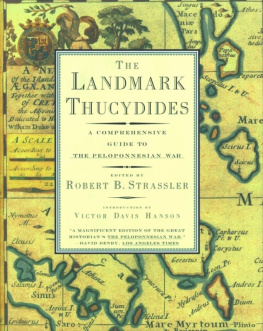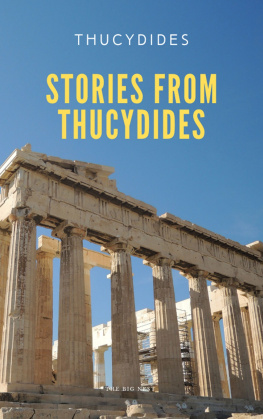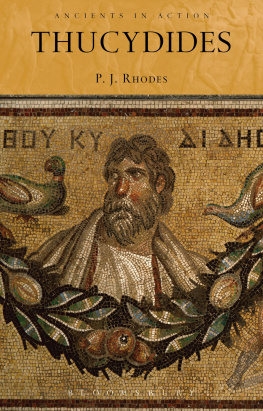Thucydides - The History of the Peloponnesian War
Here you can read online Thucydides - The History of the Peloponnesian War full text of the book (entire story) in english for free. Download pdf and epub, get meaning, cover and reviews about this ebook. year: 2012, publisher: Duke Classics, genre: Romance novel. Description of the work, (preface) as well as reviews are available. Best literature library LitArk.com created for fans of good reading and offers a wide selection of genres:
Romance novel
Science fiction
Adventure
Detective
Science
History
Home and family
Prose
Art
Politics
Computer
Non-fiction
Religion
Business
Children
Humor
Choose a favorite category and find really read worthwhile books. Enjoy immersion in the world of imagination, feel the emotions of the characters or learn something new for yourself, make an fascinating discovery.
- Book:The History of the Peloponnesian War
- Author:
- Publisher:Duke Classics
- Genre:
- Year:2012
- Rating:3 / 5
- Favourites:Add to favourites
- Your mark:
- 60
- 1
- 2
- 3
- 4
- 5
The History of the Peloponnesian War: summary, description and annotation
We offer to read an annotation, description, summary or preface (depends on what the author of the book "The History of the Peloponnesian War" wrote himself). If you haven't found the necessary information about the book — write in the comments, we will try to find it.
The History of the Peloponnesian War — read online for free the complete book (whole text) full work
Below is the text of the book, divided by pages. System saving the place of the last page read, allows you to conveniently read the book "The History of the Peloponnesian War" online for free, without having to search again every time where you left off. Put a bookmark, and you can go to the page where you finished reading at any time.
Font size:
Interval:
Bookmark:

From an 1874 edition
ISBN 978-1-62011-716-3
Duke Classics
2012 Duke Classics and its licensors. All rights reserved.
While every effort has been used to ensure the accuracy and reliability of the information contained in this edition, Duke Classics does not assume liability or responsibility for any errors or omissions in this book. Duke Classics does not accept responsibility for loss suffered as a result of reliance upon the accuracy or currency of information contained in this book.
The State of Greece from the earliest Times to theCommencement of the Peloponnesian War
Thucydides, an Athenian, wrote the history of the war betweenthe Peloponnesians and the Athenians, beginning at the momentthat it broke out, and believing that it would be a great warand more worthy of relation than any that had preceded it.This belief was not without its grounds. The preparations ofboth the combatants were in every department in the last stateof perfection; and he could see the rest of the Hellenic racetaking sides in the quarrel; those who delayed doing so at oncehaving it in contemplation. Indeed this was the greatest movementyet known in history, not only of the Hellenes, but of a largepart of the barbarian worldI had almost said of mankind. Forthough the events of remote antiquity, and even those that moreimmediately preceded the war, could not from lapse of time beclearly ascertained, yet the evidences which an inquiry carriedas far back as was practicable leads me to trust, all point tothe conclusion that there was nothing on a great scale, either inwar or in other matters.
For instance, it is evident that the country now called Hellashad in ancient times no settled population; on the contrary,migrations were of frequent occurrence, the several tribesreadily abandoning their homes under the pressure of superiornumbers. Without commerce, without freedom of communicationeither by land or sea, cultivating no more of their territorythan the exigencies of life required, destitute of capital,never planting their land (for they could not tell when an invadermight not come and take it all away, and when he did come theyhad no walls to stop him), thinking that the necessities ofdaily sustenance could be supplied at one place as well asanother, they cared little for shifting their habitation, andconsequently neither built large cities nor attained to any otherform of greatness. The richest soils were always most subjectto this change of masters; such as the district now calledThessaly, Boeotia, most of the Peloponnese, Arcadia excepted,and the most fertile parts of the rest of Hellas. The goodnessof the land favoured the aggrandizement of particular individuals,and thus created faction which proved a fertile source of ruin.It also invited invasion. Accordingly Attica, from the povertyof its soil enjoying from a very remote period freedom fromfaction, never changed its inhabitants. And here is noinconsiderable exemplification of my assertion that the migrationswere the cause of there being no correspondent growth in otherparts. The most powerful victims of war or faction fromthe rest of Hellas took refuge with the Athenians as a saferetreat; and at an early period, becoming naturalized,swelled the already large population of the city to such aheight that Attica became at last too small to hold them, andthey had to send out colonies to Ionia.
There is also another circumstance that contributes not a littleto my conviction of the weakness of ancient times. Before the Trojanwar there is no indication of any common action in Hellas, norindeed of the universal prevalence of the name; on the contrary,before the time of Hellen, son of Deucalion, no such appellationexisted, but the country went by the names of the different tribes, inparticular of the Pelasgian. It was not till Hellen and his sonsgrew strong in Phthiotis, and were invited as allies into the othercities, that one by one they gradually acquired from the connectionthe name of Hellenes; though a long time elapsed before that namecould fasten itself upon all. The best proof of this is furnished byHomer. Born long after the Trojan War, he nowhere calls all of them bythat name, nor indeed any of them except the followers of Achillesfrom Phthiotis, who were the original Hellenes: in his poems theyare called Danaans, Argives, and Achaeans. He does not even use theterm barbarian, probably because the Hellenes had not yet beenmarked off from the rest of the world by one distinctiveappellation. It appears therefore that the several Helleniccommunities, comprising not only those who first acquired the name,city by city, as they came to understand each other, but also thosewho assumed it afterwards as the name of the whole people, were beforethe Trojan war prevented by their want of strength and the absenceof mutual intercourse from displaying any collective action.
Indeed, they could not unite for this expedition till they hadgained increased familiarity with the sea. And the first personknown to us by tradition as having established a navy is Minos. Hemade himself master of what is now called the Hellenic sea, andruled over the Cyclades, into most of which he sent the firstcolonies, expelling the Carians and appointing his own sons governors;and thus did his best to put down piracy in those waters, anecessary step to secure the revenues for his own use.
For in early times the Hellenes and the barbarians of the coastand islands, as communication by sea became more common, weretempted to turn pirates, under the conduct of their most powerful men;the motives being to serve their own cupidity and to support theneedy. They would fall upon a town unprotected by walls, andconsisting of a mere collection of villages, and would plunder it;indeed, this came to be the main source of their livelihood, nodisgrace being yet attached to such an achievement, but even someglory. An illustration of this is furnished by the honour with whichsome of the inhabitants of the continent still regard a successfulmarauder, and by the question we find the old poets everywhererepresenting the people as asking of voyagers"Are they pirates?"asif those who are asked the question would have no idea ofdisclaiming the imputation, or their interrogators of reproaching themfor it. The same rapine prevailed also by land.
And even at the present day many of Hellas still follow the oldfashion, the Ozolian Locrians for instance, the Aetolians, theAcarnanians, and that region of the continent; and the custom ofcarrying arms is still kept up among these continentals, from theold piratical habits. The whole of Hellas used once to carry arms,their habitations being unprotected and their communication witheach other unsafe; indeed, to wear arms was as much a part of everydaylife with them as with the barbarians. And the fact that the people inthese parts of Hellas are still living in the old way points to a timewhen the same mode of life was once equally common to all. TheAthenians were the first to lay aside their weapons, and to adopt aneasier and more luxurious mode of life; indeed, it is only lately thattheir rich old men left off the luxury of wearing undergarments oflinen, and fastening a knot of their hair with a tie of goldengrasshoppers, a fashion which spread to their Ionian kindred andlong prevailed among the old men there. On the contrary, a modeststyle of dressing, more in conformity with modern ideas, was firstadopted by the Lacedaemonians, the rich doing their best to assimilatetheir way of life to that of the common people. They also set theexample of contending naked, publicly stripping and anointingthemselves with oil in their gymnastic exercises. Formerly, even inthe Olympic contests, the athletes who contended wore belts acrosstheir middles; and it is but a few years since that the practiceceased. To this day among some of the barbarians, especially inAsia, when prizes for boxing and wrestling are offered, belts are wornby the combatants. And there are many other points in which a likenessmight be shown between the life of the Hellenic world of old and thebarbarian of to-day.
Font size:
Interval:
Bookmark:
Similar books «The History of the Peloponnesian War»
Look at similar books to The History of the Peloponnesian War. We have selected literature similar in name and meaning in the hope of providing readers with more options to find new, interesting, not yet read works.
Discussion, reviews of the book The History of the Peloponnesian War and just readers' own opinions. Leave your comments, write what you think about the work, its meaning or the main characters. Specify what exactly you liked and what you didn't like, and why you think so.









